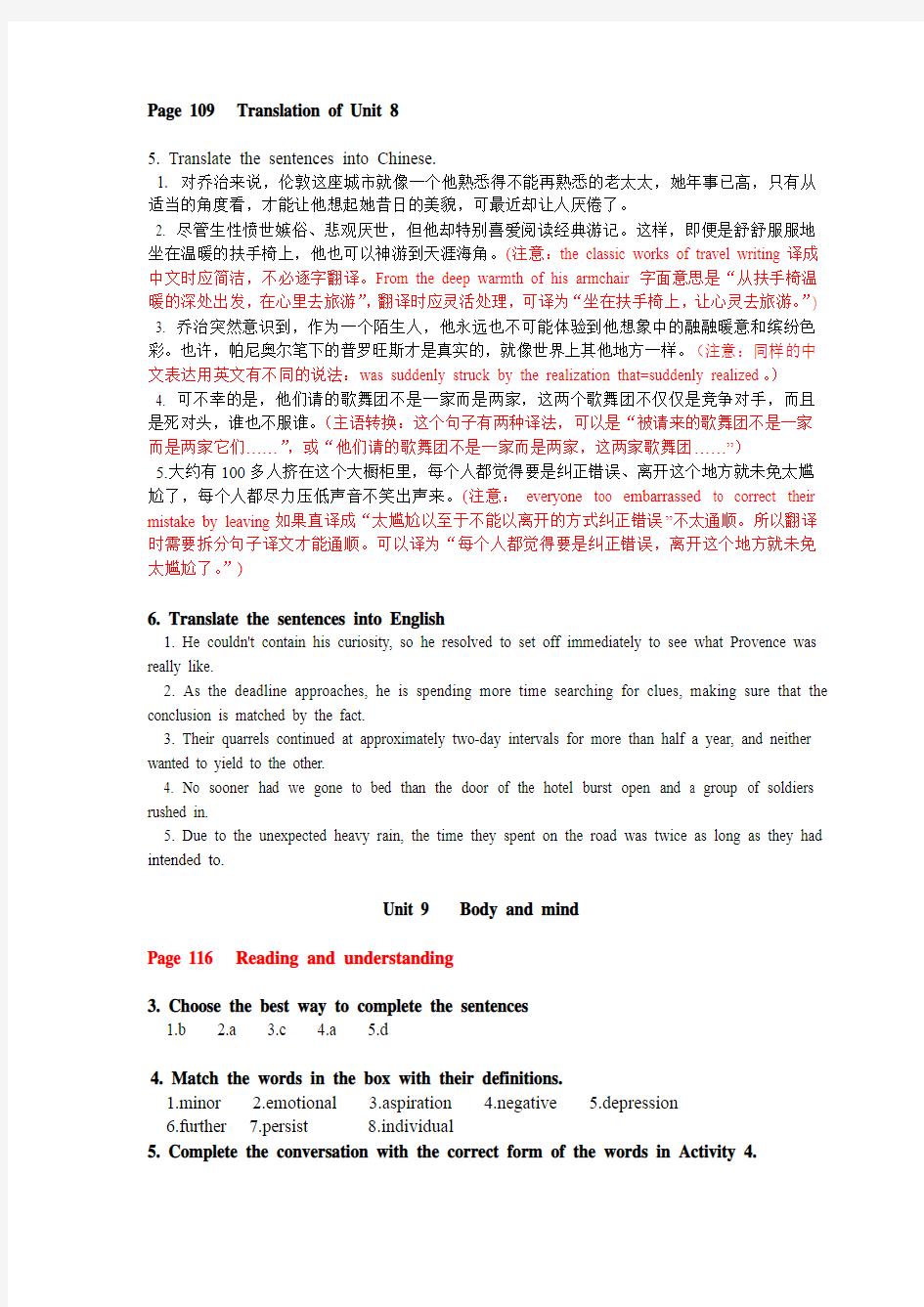
新标准英语第一册综合练习答案unit9
- 格式:doc
- 大小:40.50 KB
- 文档页数:5


Page 109 Translation of Unit 8
5. Translate the sentences into Chinese.
1. 对乔治来说,伦敦这座城市就像一个他熟悉得不能再熟悉的老太太,她年事已高,只有从适当的角度看,才能让他想起她昔日的美貌,可最近却让人厌倦了。
2. 尽管生性愤世嫉俗、悲观厌世,但他却特别喜爱阅读经典游记。这样,即便是舒舒服服地坐在温暖的扶手椅上,他也可以神游到天涯海角。(注意:the classic works of travel writing译成中文时应简洁,不必逐字翻译。From the deep warmth of his armchair 字面意思是“从扶手椅温暖的深处出发,在心里去旅游”,翻译时应灵活处理,可译为“坐在扶手椅上,让心灵去旅游。”)
3. 乔治突然意识到,作为一个陌生人,他永远也不可能体验到他想象中的融融暖意和缤纷色彩。也许,帕尼奥尔笔下的普罗旺斯才是真实的,就像世界上其他地方一样。(注意:同样的中文表达用英文有不同的说法:was suddenly struck by the realization that=suddenly realized。)
4. 可不幸的是,他们请的歌舞团不是一家而是两家,这两个歌舞团不仅仅是竞争对手,而且是死对头,谁也不服谁。(主语转换:这个句子有两种译法,可以是“被请来的歌舞团不是一家而是两家它们……”,或“他们请的歌舞团不是一家而是两家,这两家歌舞团……”)
5.大约有100多人挤在这个大橱柜里,每个人都觉得要是纠正错误、离开这个地方就未免太尴尬了,每个人都尽力压低声音不笑出声来。(注意:everyone too embarrassed to correct their mistake by leaving如果直译成“太尴尬以至于不能以离开的方式纠正错误”不太通顺。所以翻译时需要拆分句子译文才能通顺。可以译为“每个人都觉得要是纠正错误,离开这个地方就未免太尴尬了。”)
6. Translate the sentences into English
1. He couldn't contain his curiosity, so he resolved to set off immediately to see what Provence was really like.
2. As the deadline approaches, he is spending more time searching for clues, making sure that the conclusion is matched by the fact.
3. Their quarrels continued at approximately two-day intervals for more than half a year, and neither wanted to yield to the other.
4. No sooner had we gone to bed than the door of the hotel burst open and a group of soldiers rushed in.
5. Due to the unexpected heavy rain, the time they spent on the road was twice as long as they had intended to.
Unit 9 Body and mind
Page 116 Reading and understanding
3. Choose the best way to complete the sentences
1.b
2.a
3.c
4.a
5.d
4. Match the words in the box with their definitions.
1.minor
2.emotional
3.aspiration
4.negative
5.depression
6.further
7.persist
8.individual
5. Complete the conversation with the correct form of the words in Activity 4.
1.negative
2.depression
3.aspirations
4.furthermore
5.minor
6.emotional
7.individual
8.persist
6. Replace the underlined words with the correct form of the words in the box.
1. psychological
2.disorders
3.specifically
4.readily
5.survival
6.killer
7.glorious
8.career
9.realistic
7. Answer the questions about the words and expressions
1. a
2.b
3.a
4.a
5.a
6.b
7.a
8.b
9.b
8. Look at the sentence from the passage and answer the question.
Why does the write ask this question? ( c )
Now look at the passage and find more examples of focusing questions.
1.Have they always been clear about where they’re going in their lives, and now
that they have arrived, are they happy and healthy?
2.But what if success is extremely unlikely?
3.Can being too persistent have a negative effect on your health?
4.So why do Bulldogs finally say, “Enough is enough”?
9. Work in pairs and discuss the questions.
1. Do you think Bulldogs and Quitters really exist? Do you know why?
·Researchers must have based their ideas on real people, but can people really be divided in this way? Surely most people would be between the two extremes of Bulldogs and Quitters, and it would depend on the context or circumstances
·The same person might be a Quitter for some goals, but a Bulldog for some others. There must be other categories besides Bulldogs and Quitters.
2. What characters are traditionally given to animals in China? How useful is it to use them to refer to humans?
The most obvious examples are the characters Chinese people usually believe the 12 symbolic animals have. Many people in China and in the West are interested in these ideas, but perhaps mainly for fun. I don’t think it is very useful because not many people seem to believe that the animal signs have a strong influence on their lives.
Rat: intelligent, imaginative Ox: hard-working, patient
Tiger: loyal, courageous Rabbit: prudent, honest
Dragon: dynamic, lucky Snake: organized, wise
Horse: enthusiastic, enterprising Goat: gentle, adaptable
Monkey: intelligent, clear-minded Rooster: honest, courageous
Dog: faithful, reliable Pig: honest, tolerant
3. Do you think the psychological research of Bulldogs and Quitters described in the passage is useful? Why/Why not?
·I think such research with only two categories (Bulldogs and Quitters) is limited, but their link with health seems interesting.
·This magazine-type of article is trying to make psychology popular, but it is not real